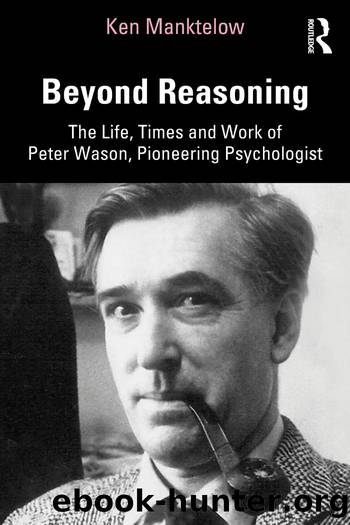Beyond Reasoning by Ken Manktelow

Author:Ken Manktelow [Manktelow, Ken]
Language: eng
Format: epub
ISBN: 9781000287653
Publisher: Taylor and Francis
Published: 2021-05-15T00:00:00+00:00
12
MOVING ON
Team work
Wason may have had a gut aversion, turning into a flat refusal, to teaching classes of undergraduates, but the same could not be said of his dealing with postgraduate PhD students. On the contrary, he positively revelled in this, and he was good at it. Apart from Norman Wetherick, who never allowed Wason near him again after their first encounter, former students have over the years been generous in their praise of his skills as a supervisor. This was not just to do with his approach to one-to-one sessions with individuals, either: he also during this time started running a postgraduate seminar programme, still recalled in awed terms by those who were there.
In the normal run of things, a seminar programme in a university department features researchers, from within and outside oneâs institution, talking about their work, giving an account of their results and their theoretical ideas, and so on, and fielding vigorous, even hostile, questions at the end. Popperâs seminars at the London School of Economics (LSE) were certainly like this, and so was the one run alongside Wasonâs by Jonckheere. Not in Wasonâs seminar, however. The ground rules, outlined in general terms by Wason at the start of the series and never challenged by anyone, were that its purpose was to help people develop their ideas: speakers would talk about what they were interested in, how they proposed to study it, and where they thought it might lead, and the other attenders chipped in with their thoughts. Criticism was only ever to be constructive. This was in line with Wasonâs personal practice: he liked to ruminate by himself when generating ideas for research, collaborating with people only once he had something. The seminar was a way of formalising this procedure: a student was to come up with an idea and then talk about it with others. It was also open to people other than Wasonâs students: Sheila Jones was a regular participant, as were other members of academic staff, and it sometimes included external speakers, occasionally from outside Psychology altogether (Popperâs almost equally celebrated successor at the LSE, the philosopher of science Imre Lakatos, was one). They were invited by Wason purely on the grounds that they or their ideas were, his guiding principle, interesting.
Praise for Wasonâs approach as a supervisor was not without reservation, it should be said; one, Liz Valentine (Elizabeth Cornish, as she then was) spoke for many in recalling how Wason was no use at all when it came to analysing research data. He himself relied on Whitfield and Jonckheere for statistical advice; John Valentine, her future husband, filled this role for her. She had George Drew as a nominal main supervisor; Wason was not allowed to fill this role as he was not a payroll member of University College London (UCL) staff, being externally funded. This or a similar arrangement must have applied to all those he supervised while he was still funded by the MRC.
She also ran into problems with
Download
This site does not store any files on its server. We only index and link to content provided by other sites. Please contact the content providers to delete copyright contents if any and email us, we'll remove relevant links or contents immediately.
| Administration & Medicine Economics | Allied Health Professions |
| Basic Sciences | Dentistry |
| History | Medical Informatics |
| Medicine | Nursing |
| Pharmacology | Psychology |
| Research | Veterinary Medicine |
Periodization Training for Sports by Tudor Bompa(8240)
Why We Sleep: Unlocking the Power of Sleep and Dreams by Matthew Walker(6688)
Paper Towns by Green John(5168)
The Immortal Life of Henrietta Lacks by Rebecca Skloot(4569)
The Sports Rules Book by Human Kinetics(4374)
Dynamic Alignment Through Imagery by Eric Franklin(4201)
ACSM's Complete Guide to Fitness & Health by ACSM(4043)
Kaplan MCAT Organic Chemistry Review: Created for MCAT 2015 (Kaplan Test Prep) by Kaplan(3994)
Livewired by David Eagleman(3757)
Introduction to Kinesiology by Shirl J. Hoffman(3755)
The Death of the Heart by Elizabeth Bowen(3599)
The River of Consciousness by Oliver Sacks(3590)
Alchemy and Alchemists by C. J. S. Thompson(3506)
Bad Pharma by Ben Goldacre(3415)
Descartes' Error by Antonio Damasio(3264)
The Emperor of All Maladies: A Biography of Cancer by Siddhartha Mukherjee(3135)
The Gene: An Intimate History by Siddhartha Mukherjee(3086)
The Fate of Rome: Climate, Disease, and the End of an Empire (The Princeton History of the Ancient World) by Kyle Harper(3050)
Kaplan MCAT Behavioral Sciences Review: Created for MCAT 2015 (Kaplan Test Prep) by Kaplan(2974)
